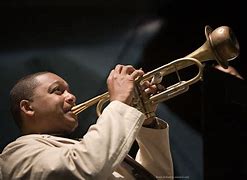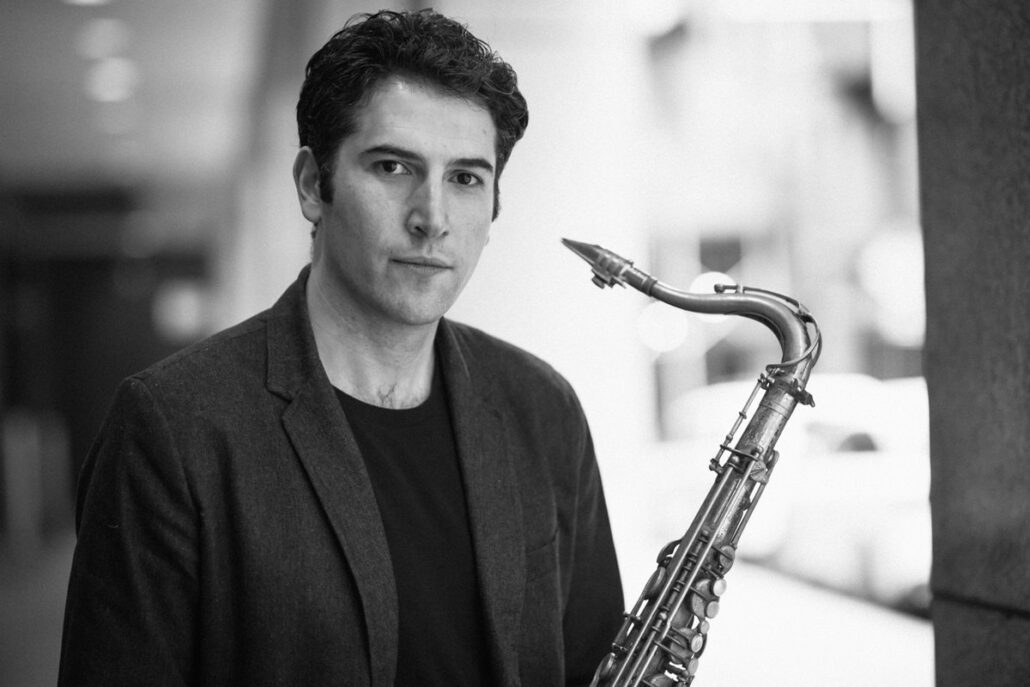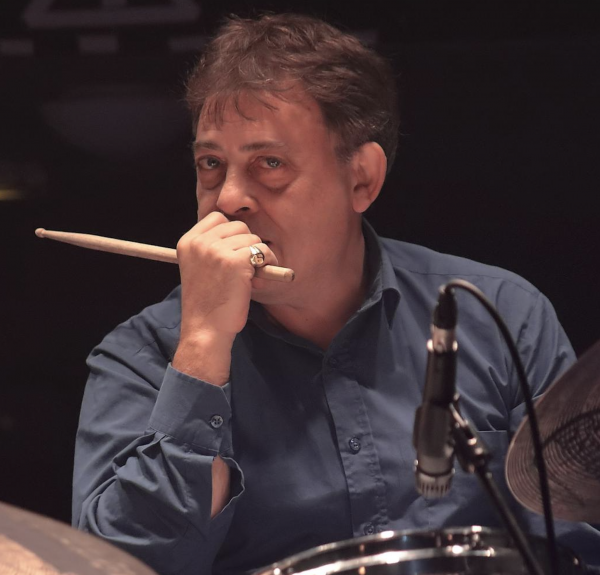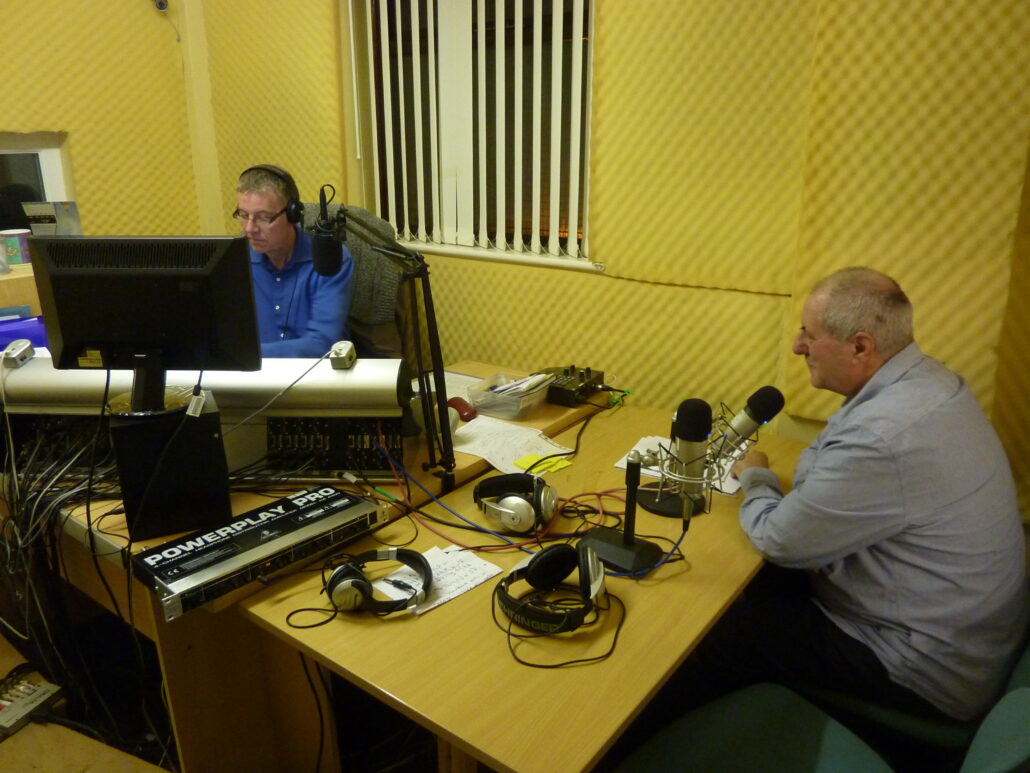THE DEMOCRACY! SUITE music for our times
THE DEMOCRACY! SUITE music for our times
by Norman Warwick & Steve Bewick
founder members of the joined up jazz journalists
Whilst we prefer you to think of Sidetracks & Detours as being an organisation of peace and tolerance there are times when even journalists working in a genre they all love each love it in a different way ! Sometimes we disagree about historical jazz events, at other times we might not be of one accord about what should be the future developments of jazz. So when a review sent me scurrying to listen to a new album by Wynton Marsalis I was thrilled by what I heard and immediately contact my joined up jazz journalist pal Steve Bewick to rave about the album. However, I came to realise Steve is not such a fan of this artist as he sought to curb my enthusiasm.

´Wynton Marsalis (left) has undoubtedly been one of the central figure in jazz for the past two decades,´ Steve agreed. ´Since 1980 he has released more than 50 improvisational and classical recordings, composed ambitious pieces for instruments, voice and dance, and headed the high-profile Jazz at Lincoln Centre program. He has also become the leading public advocate for the centrality of jazz in American culture.
His outspoken eloquence for his view of the jazz tradition, most prominently in Ken Burns’ massive PBS/TV documentary “Jazz”, has also made him hugely controversial. His pronouncements that the styles that emerged from jazz since the nineteen sixties, e.g. free jazz, jazz-rock fusion, the avant garde, are not really jazz at all have infuriated many musicians and jazz writers including yours truly. For me he is the Conservative voice of jazz with a selective and backward facing vision. Still, even i would have to acknowledge that Marsalis is a musician with impeccable technique and a vast knowledge of the source music
Typically the common question put to me as a jazz broadcaster, ´what is jazz?´would be answered by Marsalis, no doubt, as being, ´a combination of different elements, a shuffle rhythm, walking bass, the blues, an improvised, coherent solo, a certain percentage of African or Afro-Cuban music and romantic elements taken from the American popular song.´
Herein lies my dilemma with Marsalis. He stand Canute like before the waves of progress within this artwork urging it to stop, go back.´
Nevertheless,
´Jazz music is the perfect metaphor for democracy,´ says famed trumpeter Wynton Marsalis, and as soon as we hear that phrase we kind of know what he means. With America, and indeed, the whole world standing at a crossroads, almost too afraid to put one foot in front of the other and not knowing it one direction the country should travel anyway, the Pulitzer Prize-winning composer felt inspired to write a poignant and buoyant work, The Democracy! Suite, to prove that the joy and beauty of jazz can, indeed, bring us all closer together.

That new suite is now a digital album from Marsalis and a septet composed of members of the famed Jazz at Lincoln Center Orchestra. Recorded live in Jazz at Lincoln Center’s Appel Room during the Covid-19 lockdown, the work is, says Mac Randall at Jazz Times, ´irresistible and irrepressible.´
The journalist nominates tracks like Out Amongst the People (For J Bat) and Be Present as an impassioned reflection of turbulent times that find peerless musicians working as a harmonious community, urging us to reflect on the past and reconsider the future.
´The question that confronts us right now as a nation is, ‘Do we want to find a better way?’´ Marsalis says. The music of The Democracy! Suite may be instrumental, but it speaks for itself, urging us into action—to get out of our seats and fight for the world we believe in.
The Democracy! Suite is now available on all digital platforms. You can choose your platform of choice here.

Ted Nash With Marsalis here on trumpet, we have Ted Nash on alto and soprano shades of saxophone and Walter Blanding on soprano and tenor textures. Elliot Mason plays trombone and bass trumpet with Dan Nimmer on piano, Carlos Henriquez on bass and Obed Calvaire on drums.
The Democracy ! Suite came out in digital format on 15th January 2021 on Blue Engine Records. There are eight tracks in all, being:
Be Present, Sloganize Pàtronize Realize Revoltionise (Black Lives Matter, Ballot Box Bounce, That Dance We Do That You Love Too, Deeper Than Dreams, Out Amongst The People, It Comes Round ´Gin, and That´s When All Will See.
The Democracy! Suiteattempts to answer two tighly-wound questions:
How can you make new collaborative art during a pandemic that requires separation?
How does that art best address the issues confronting us at this fraught time?
These eight digital tracks have been released by a seven-piece subset of the Jazz at Lincoln Center Orchestra, and are part of a ´virtual´ performance recorded at the orchestra’s NYC home-base that subsequently ´played´ more than twenty performing arts centres in the U.S.
The music is intended to demonstrate ´that the joy and beauty of jazz can bring us all closer together,´ Wynton Marsalis says in a press release. They succeed at their job, as this music is nothing if not tight.
It was interesting to read that Mac Randall, rightly I think, believes that the music of The Democracy! Suite works just fine on its own terms as well: knowledge of its context or any of the background laid out in the above paragraph is not essential to the enjoyment its considerable groove.

The set begins with Be Present, described as ´a solidly swinging number´ featuring robust solos by Marsalis (who steps up on every track), pianist Dan Nimmer, and trombonist Elliot Mason. Its slight retro and, given the overall work’s serious intent, cheerful vibe is perhaps surprising. The truth is, though, that none of this music feels sombre, fearful, or detached. Even the more reflective pieces, like the chilled Deeper Than Dreams, or the more widely explorative Sloganize, Patronize, Realize, Revolutionize…´ retain an optimistic quality. Ballot Box Bounce, which features no less than six of the Jazz at Lincoln Center Orchestra (see right) players taking solo turns is, indeed, bouncy, striding along as if late for work. There´s some determination here. There´s a job to be done ! Ted Nash’s flute and Walter Blanding’s tenor saxophone on this track by the way are described by the Jazz Times reviewer as superb.
In fact, the writer´s conclusion is that perhaps there’s an underlying message here that doesn’t need to be hammered home: that the way we get through all this is by keeping our heads held high, working together, and remembering how to smile.
We have featured Wynton Learson Marsalis previously on our pages here at Sidetracks & Detours, and we know there are many fans of Marsalis amongst those who follow my jazz journals here and also amongst those who listen to my fellow joined up journalists like Steve Bewick and Gary Heywood-Everett on the Hot Biscuits radio programme. I also seem to recall that Steve Cooke and I even featured Marsalis and his work on the all across the arts pages of The Manchester Evening News Media Group when we were jointly delivering the pages Steve Cooke has taken to new heights since I moved over here to Lanzarote.
Trumpeter, composer, teacher and now an artistic director of Jazz at Lincoln Centre Wynton Marsalis has tirelessly promoted classical and jazz music, often to young audiences.
He has won at least nine Grammy Awards, and his Blood On The Fields was the first jazz composition to win the Pulitzer Prize for Music. He remains the only musician to win a Grammy Award in jazz and classical during the same year. Today, it seems, he has once again delivered an album for our times,…. and for the times to come.
It might be that I am espousing the virtues of a particular album here whereas Steve Bewick is contextualising Marsalis, but that serves to actually support what we have quoted Wynton himself as saying, ´Jazz music is the perfect metaphor for democracy.´

photo by Fred Hamelin
Meanwhile, our friends from Jazz In Reading (see our post of 9 / 4 / 2021) have a special event this week featuring the Clark Tracey Quartet, with Bruce Boardman on piano, Simon Allen playing tenor sax, Andrew Cleyndert on bass, and Clark himself on drums. This will be a Livestream event from the Boileroom, Guildford, celebrating the compositions of Stan Tracey. It all happens at 7.30 pm on Wednesday 14th April and you can purchase Tickets here or by checking out the Jazz In Reading web site.

This article was written by Norman Warwick and Steve Bewick, two of the four founder members of the Joined Up Jazz Journalists (JUJJ) formed in 2021to share their love of jazz and to grow their own knowledge for the benefit of readers and listeners. The other JUJJ members are Gary Heywood-Everett and Susana Fondon.
Steve Bewick is a writer and broadcaster of the weekly and streamed Hot Biscuits jazz radio programme and a regular contributor to these pages.
Gary Heywood Everett is a jazz researcher and historian, and a frequent contributor to these pages, and tomorrow we publish his review of a new book, Subversion Through Jazz.
Susan Fondon is a colleague of Norman´s writing a weekly column for Lanzarote Informantion on line. Norman Warwick is an author, poet and radio presenter and owner and editor the Sidetracks & Detours daily blog.
You can hear Steve and Gary present Hot Biscuits at www.fc-radio.co.uk, and read articles by Susana and Norman at Lanzarote information on line via their subscription newsletter-
Norman´s daily Sidetracks & Detours blog can be found at https://aata.dev
If you wish to submit news, interviews, previews or reviews of arts events of any kind please do so via e mail to normanwarwick55@gmail.com
Articles subsequently published will be fully attributed, so feel free to include a brief personal biography and photograph if you wish.
We look forward to hearing from you at Sidetracks & Detours




Leave a Reply
Want to join the discussion?Feel free to contribute!